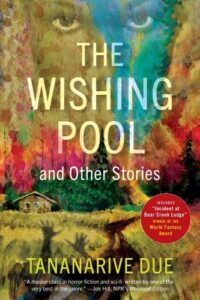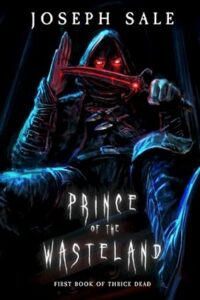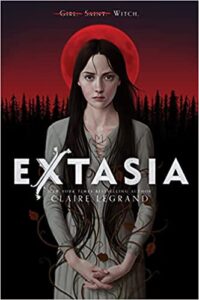The Wishing Pool and Other Stories by Tananarive Due
Akashic Books, 2024
ISBN-13 : 978-1636141794
Available: Paperback, hardcover, Kindle edition, audiobook
Buy: Bookshop.org | Amazon.com
The Wishing Pool is a brilliant collection of of horror and Afrofuturistic short stories centering Black characters, Tananarive Due’s first short story collection since Ghost Summer. While it’s mostly reprints, there are a few stories that only appear here, and the majority of readers will find plenty of work new to them.
The collection is divided into four sections: “Wishes”, “The Gracetown Stories”, “The Nayima Stories”, and “Future Shock”.
“Wishes” includes “The Wishing Pool”, a heartbreaking story in which Joy, desperate to restore her father from his dementia, makes a wish on the wishing pool, despite knowing it might have unpleasant consequences, “Incident at Bear Creek Lodge”, which won the World Fantasy Award, and “Dancing”, in which Monique, her recently deceased grandmother’s caretaker, is forced to dance to death after internalizing her thwarted dream to become a ballerina, among its six tales.
“The Gracetown Stories” includes five stories, all involving individuals from the fictional Gracetown, Florida, where racism, Florida weirdness, and the supernatural combine. Gracetown first appears in Ghost Summer, and the Gracetown School for Boys is the setting for Due’s Stoker-winning novel The Reformatory. Due does a great job creating an atmospheric Florida setting, laced with terror. in “Last Stop on Route 9”, Charlotte and her 12 year old cousin Kai drive out of a mysterious fog and pull over to a gas station to ask for directions… which could be the last thing they ever do. “Rumpus Room” follows a single mother who has lost custody of her daughter after she takes a job working as housekeeper, living in an unattached “rumpus room” that used to belong to her employer’s deceased daughter. There’s something disturbingly wrong about the room, though… Due does a great job creating an environment of uncertainty, dread, and panic.
“The Nayima Stories” are a pair of stories that follow Nayima, immune but a carrier of a plague that has caused mass deaths. “One Day Only” takes place during the plague, with survivors staking their places in an abandoned Malibu until they’re forcibly moved, taking a moment to come together. “Attachment Disorder” takes place after a vaccine has been discovered…. but that hasn’t made things easier for carriers. Due’s world-building is fantastic- you really feel like you are inhabiting Nayima’s world. “Future Shock” contains three additional plague and post-plague stories, unrelated to Nayima’s world, taking place in the future. “The Biographer” is a disorienting story about Olivia, an elderly screenwriter whose prescient movie about a global plague made her famous, who has been assigned a very strange Biographer to tell her life story.
Short story collections usually have misses as well as hits. The Wishing Pool is the rare collection where every story is outstanding, Highly recommended.
Reviewed by Kirsten Kowalewski







Follow Us!